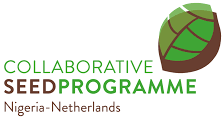taken from the web page of NASC https://seedcouncil.gov.ng/training-of-licensed-seed-inspectors-and-seed-companies-in-digitalization-of-bt-cowpea-production/
This is a dummy test text
Seed Field Inspection
A total of 32,615.09 Ha was inspected for certification purposes in 2022, as compared to 42,677
Ha in 2021 representing a decrease of 23.58%. Meanwhile, 32,350.64 Ha (99.18%) passed the
field standards, while 264.45 Ha (0.82%) failed to meet the minimum field standards and were
rejected. This figure includes 34.27 Ha for cassava cuttings and 255.27 Ha maize varieties
inbred lines fields.
Seed Production
The Breeder Seed production declined by 12.69% in 2022 as production declined
from 272.81MT in 2021 to 238.19MT in 2022. Maize, rice, and soybean were the
primary crops with significant breeder seed production. However, the production of
Foundation Seed increased by 53.43% in 2022 with 8,596.93MT produced as
against 4,012.06MT in 2021. This is as a result of aggressive effort by NASC to
sensitized the NARIs and intervention projects on EGS production especially for maize,
rice, sorghum, millet, cowpea, soybean. The production of Certified seed also witnessed a
32.99% decline in 2022, with 87,333.95MTproduced from passed seed lots as
against 130,334 MT in 2021 with maize and rice contributing to the decline
significantly. It is however, observed that this may be due to low patronage from
farmers and huge carryover stock from the previous years by certified seed class
producers. However, total seed production decreased by 28.55% in 2022 with a total
of 96,169.07MT as compared with 143,598.25MT produced in 2021 as a result of
some seed fields submerged by massive floods witnessed in 2022 especially rice seed
fields.
Certified Seed Price:
Seed prices per kilogram varies for crops, such as maize hybrid, maize OPVs, rice, sorghum,
millet, cowpea, soybean, groundnut, cotton, sesame, and kenaf. The Price variations observed
across different crop types were reflections of market dynamics and demand.
Seed Testing Activities
A total of 6,645 seed samples (commercial and experimental) were submitted for testing,
covering a variety of crops. Purity, germination, moisture content, and molecular diagnostic
tests were conducted. 98.9% of samples passed purity standards, while 1.1% failed. Red rice
contamination was detected in rice seed lots, indicating genetic impurity while 96.3% of
samples met the germination standard and 3.7% failed. Overall, most seeds exhibited
satisfactory germination potential. For Rice samples indicated low genetic purity, with 3%
10
containing red rice seeds and other weed species, seed moisture content ranged from 8.2% to
11.0%, meeting acceptable limits. Molecular Diagnostic Activities: Cassava virus indexing
revealed positive results for some viruses. Quality assurance programs with AATF and ICRC
ensured genetic purity and quality.
Grow-Out-Test (GOT) field for seed quality assurance under field conditions
The Seed Certification and Quality Control department carried out a comprehensive
evaluation of the 2022 Grow-Out-Test (GOT) protocols for various seed crops, including
rice, soybeans, cowpea, and maize. The purpose was to ensure genetic purity and identity of
Early Generation Seeds (EGS) and Certified Seeds in the Nigerian seed industry. Most seed
varieties demonstrated high genetic purity, meeting or surpassing set standards. This
emphasizes the industry's commitment to maintaining seed integrity. Also, the evaluation
provided valuable insights into variety performance, aiding research and distribution
decisions especially for traded seeds and providing reliable, high-quality seeds to Nigerian
farmers.
Certification Tags
In adherence to international standards and best practices, NASC employs a third-party
guarantee system for all traded seeds in the country. This system utilizes seed certification
and SEEDCODEX tags to ensure traceability, prevent adulteration, and maintain the integrity
of traded seeds. A total of 70 seed companies made requests for SEEDCODEX and
Certification tags for the certified seed class as 1,938,000 of jumbo size valued at
N48,745,000 and 784,000 of small size valued at N11,985,000 were sold for certification
purposes. These tags play a crucial role in verifying the authenticity and quality of seeds,
enhancing consumer trust and promoting transparency in the seed industry.
Registration of Seed Enterprises and License Renewal.
In 2022, a total of 70 entities sought seed entrepreneurship accreditation while 98 seed
entrepreneurs renewed their operating licenses. This annual process ensures adherence to
standards and sustains seed industry integrity demonstrating commitments of industry
players.
